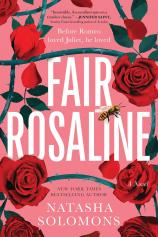Fair Rosaline
Review
Fair Rosaline
Whether you’re a Shakespeare aficionado or only remember the Bard from high school English class, you undoubtedly know the story of Romeo and Juliet, the ill-fated lovers whose romance was abruptly ended by the far-reaching repercussions of a family feud. You may even remember Rosaline, Lord Capulet's niece, for whom Romeo holds an unrequited love. However, when Romeo crashes a Capulet party to try to catch a glimpse of her younger cousin, Juliet, it begins the love story of all love stories. So, in a sense, there is no Juliet without Rosaline.
But who was Rosaline, really? This unexplored and underappreciated character takes center stage in Natasha Solomons’ FAIR ROSALINE.
"FAIR ROSALINE is a spellbinding, creatively crafted book, and Solomons’ assured and courageous handling of perhaps the world’s best known tale is simply incredible."
When we meet 15-year-old Rosaline, she is laying her beautiful mother to rest along with her grief-stricken father and useless brother. Emelia has died of the plague, and Rosaline feels that the light has gone out of her life. Her parents’ marriage shocked many as it was borne of true love rather than financial or political gain. But her father seems to have spent all his affection on his bride, leaving little to spare for her.
The Capulets must endure a quarantine to prove that they do not carry the same sickness that took their matriarch. When they are finally cleared, they head to the hills of Verona where the air is said to be clearer and cleaner, free of the city’s pestilence. Rosaline welcomes the chance to be distracted and to be removed from the place where her grief feels strongest.
But on the way to their villa, her father and brother deliver a shocking blow: Emelia has left a letter for Rosaline revealing her final wish --- that she join a convent and become a nun. Having witnessed the loving marriage of her parents and reaching an age where boys are becoming more and more interesting, Rosaline is devastated. The nunnery, as she sees it, is the end of her life. She bargains with her father for one year of freedom to soak up all that the world has to offer. He gives her 12 days.
Freedom comes for Rosaline in the form of a Montague party only a few villas away. The feud between the Capulets and Montagues is well known, and as long as she has been alive, Rosaline has been taught that the Montagues are violent, grotesque sinners. Figuring that she has the rest of her life to seek forgiveness, she decides to get a taste of sin, disguising herself as a man and crashing the party. Before morning’s arrival, her ruse has been discovered by a gorgeous, witty and dashing man: Romeo. Rather than cursing her presence, though, he is besotted by her. Before even half of her 12-day extension is over, they are in love. (Sound familiar?)
That teenage love is mercurial and sweeping, but even Rosaline can see --- rather early on --- that Romeo’s affections are volatile and unpredictable. Still, he seems to be a better option than a nunnery and a lifetime of service to a god who stole her beloved mother. So she acquiesces, believing that any sins she commits now will be dissolved by the marriage that Romeo promises is coming.
In the book’s second half, however, Rosaline comes to her senses, confronting Romeo and his lies. She advises him to bury his love for her, forgetting that their affair ever happened. So he does just that...by moving on with her cousin. Now Rosaline has a new goal, far beyond that of grieving her mother or avoiding the nunnery: she must save Juliet from Romeo’s womanizing, philandering ways and put an end to the villain Romeo forever.
Reimagined classics are having their heyday in the book world, from remixed mythologies like CLYTEMNESTRA and ARIADNE to feminist reimaginings like DELICATE CONDITION. But in FAIR ROSALINE, Natasha Solomons takes the remix a step further, confronting the greatest love story ever told and asking the most salacious question possible: What if it was all a lie? The result is a subversive, feminist and chillingly timely tale of a womanizing predator who pursues, deflowers and ultimately steals from young girls. And this from the character we’re all taught to believe is the definition of love itself.
But this book is more than a villain origin story: Solomons also fleshes out the world of the Bard’s creation, taking the spotlight off Romeo and Juliet and building out the set to reveal a real, living, breathing world full of ugly illnesses, unwashed sheets, scuttling mice and putrid smells. And that’s just the city. Solomons’ world is gorgeous and vibrant, and her capable and masterful worldbuilding only makes the story of Rosaline come to life even more.
FAIR ROSALINE is a spellbinding, creatively crafted book, and Solomons’ assured and courageous handling of perhaps the world’s best known tale is simply incredible. Remastering a classic is always a risk, but here she shows that the reward can be far more than you ever could have expected. While I hope to see more reimagined classics from Solomons in the future, I know I’ll be ready to buy whatever she writes next. I suspect that other readers will be right in line with me.
Reviewed by Rebecca Munro on September 15, 2023
Fair Rosaline
- Publication Date: May 7, 2024
- Genres: Fiction, Historical Fiction, Women's Fiction
- Paperback: 400 pages
- Publisher: Sourcebooks Landmark
- ISBN-10: 1728299896
- ISBN-13: 9781728299891




